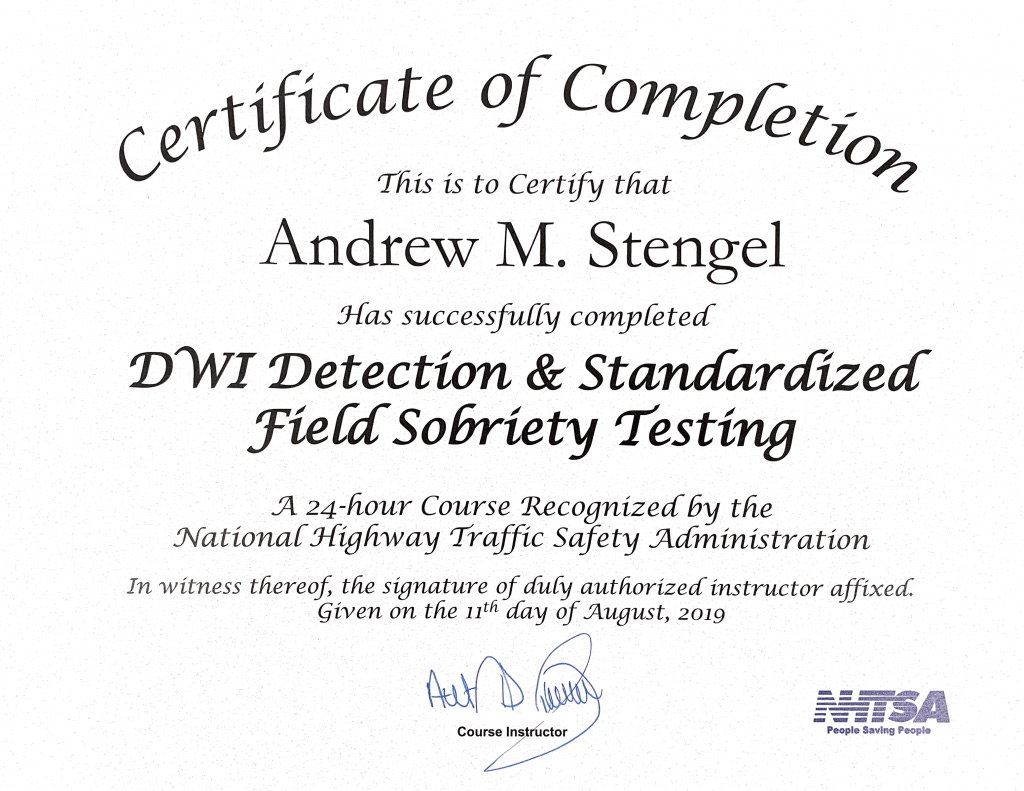DWAI in New York
Driving While Ability Impaired, or DWAI, is the least serious Driving While Intoxicated-related charge in New York. DWAI, Vehicle and Traffic Law Section 1192(1), is not a crime, but rather a traffic infraction. Whereas, Driving While Intoxicated, or DWI, is a crime in New York. A conviction to DWAI or a plea bargain of DWAI will not result in a criminal record; however, a conviction to DWI does result in a criminal record. In addition, DWAI, which is related to alcohol, should not be confused with Driving While Ability Impaired by Drugs (DWAI By Drugs), which is a crime in New York.

Andrew M. Stengel is trained the same way as police to perform DWI Standardized Field Sobriety Tests.
Under New York Law, DWAI means operating a motor vehicle “while the person’s ability to operate such motor vehicle is impaired by the consumption of alcohol.” Frequently, DWAI arrests occur when the driver’s chemical test result shows a BAC of greater than .05% but less than .08%. It is also routinely charged with DWI, whether the charge is per se or common law intoxication.
Is your DWI attorney or a DWI attorney that approved to perform Standardized Field Sobriety Tests after taking the exact same National Highway Traffic Safety Association course as police officers? If not, think again. The knowledge and experience of a DWI attorney who is approved to perform Standardized Field Sobriety Tests is crucial to every DWI case!
Reducing a DWI Charge to DWAI
District Attorneys (DAs) in New York’s 62 counties differ in their approach to DWI charges. However, in many New York counties it is possible to have a DWI charge reduced to DWAI. This is most likely to occur when:
- The breathalyzer or other chemical test result was .13% or less
- The driver has no prior arrests
- The DWI does not involve personal injury; and
- The DWI does not involve property damage
 The impact of breathalyzer test refusal on the ability to reduce the charge to DWAI is inconsistent. Many counties have a specific policy against reducing a DWI charge to DWAI if the driver has refused a chemical test, whether by breath or blood. While some DAs will take a pragmatic approach and reduce the charges when the evidence is weak and a conviction a trial is unlikely, others stand firm on the policy and will not reduce the charge even where the chances of obtaining a conviction are low.
The impact of breathalyzer test refusal on the ability to reduce the charge to DWAI is inconsistent. Many counties have a specific policy against reducing a DWI charge to DWAI if the driver has refused a chemical test, whether by breath or blood. While some DAs will take a pragmatic approach and reduce the charges when the evidence is weak and a conviction a trial is unlikely, others stand firm on the policy and will not reduce the charge even where the chances of obtaining a conviction are low.
DWAI Penalties
The maximum possible penalty for a first DWAI conviction is:
- A fine of up to $500
- A 90-day driver’s license suspension
- Up to 15 days in jail
In addition, the driver can expect:
- A $255 court surcharge (or $260 if the case is in a Town or Village Court)
- A $250 per year driver responsibility assessment for 3 years
The consequences are more severe under special circumstances, such as:
- A driver under the age of 21
- A driver holding a commercial driver’s license
However, it is very rare for a person with no prior DWI or DWAI offenses and no criminal history to be sentenced to jail for DWAI.


